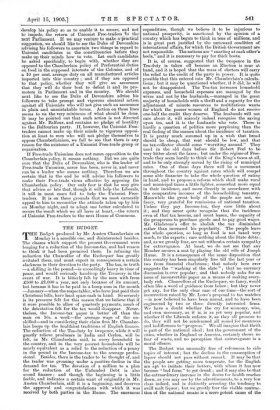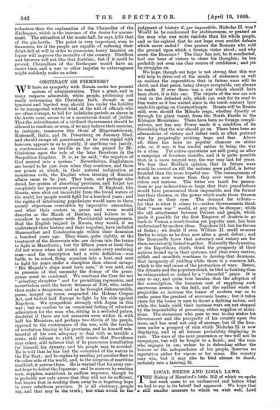THE BUDGET.
THE Budget produced by Mr. Austen Chamberlain on Monday is a sensible one, and disinterested besides. The classes which support the present Government were longing for a reduction of the Income-4,x, and had reason to think it had been promised them. In refusing the reduction the Chancellor of the Exchequer has greatly irritated them, and must expect in consequence a certain slackness in their devotion to the party: The tax, in truth —a shilling in the pound—is exceedingly heavy in time of peace, and would seriously handicap the Treasury in the event of war. It is bitterly felt by the men with from £500 to £1,000 a. year, not only - because of its amount, but because it has to be paid in a lump sum in the month —January—when the respectables, who have just paid their Christmas bills, have least spare cash in hand. So severely is its pressure felt for this reason that we believe that if it were possible to allow of quarterly payments, much of the detestation felt for the tax would disappear. Never- theless, the Income-tax payer is better off than the man on 16s. a week—the average wage of the un- skilled—and in considering their claim first Mr. Chamber- lain keeps up the healthiest traditions of English finance. The reduction of the Tea-duty by twopence, while it will greatly relieve producers in India and Ceylon, will be felt, as Mr. Chamberlain said, in every household in the country, and in the very poorest households will be nearly equivalent as a relief to the reduction of a penny in the pound in the Income-tax to the average profes- sional. Besides, there is the trader to be thought of, and the trader was groaning under a positive decline in the demand for tea. The devotion of a million to a plan for the reduction of the Unfunded Debt is also sound finance ; and though the beginning is a little feeble, and indicates a certain want of originality in Mr. Austen Chamberlain, still it is a beginning, and deserves the approval and congratulations with which it was received by both parties in the House. The enormous expenditure, though' we believe it to be injurious to national prosperity, is sanctioned by the opinion of a country which has begun to think in tens of millions, and is in great part justified by the untoward condition of international affairs, for which the British Government are not responsible. The nations are " snarling at each other's heels," and it is necessary to pay for thick boots.
It is, of course, suggested that the twopence in the Tea-duty is taken off because an Election is near 'at hand, and it is hoped that the mass of electors will carry the relief to the credit of the party in• power. It is quite possible that this entered into Mr. Chamberlain's calcula- tions ; but it may be questioned whether, if it did, he will not be disappointed. The Tea-tax increases household expenses, and household expenses are managed by the wives and not by the husbands,—managed in the great majority of households with a thrift and a capacity for the adjustment of minute resources to multifarious wants for which the poorer women of England do not receive one-half the credit they deserve. The husbands will not care about it, will scarcely indeed recognise the saving upon tea, and it is the husbands who vote. There is hardly a question of politics more perplexing than the real feeling of the masses about the incidence of taxation. It is pretty much summed up in a wish that bread should be cheap, that rent should be low, and that no tax-collector should come " worriting around." They used in the old days before Sir Robert Peel to be very bitter about the taxes ; but under the regime of Free- trade they seem hardly to think of the King's taxes at all, and to be only strongly moved by the rising of municipal rates. One of these days there will be a movement throughout the country against rates which' will compel some able financier to take the whole question of rating in hand, and to propose a reform which shall make rural and municipal taxes a little lighter, somewhat more equal in their incidence, and more directly in accordance with the comparative incomes of the householding tenantry. Meanwhile the great body of the people are not, we fancy, very grateful for remissions of national taxation. Unless they pay Income-tax, they care little about it ; and they never quite recognise that the incidence even of that tax lessens, and must lessen, the capacity of the prosperous to purchase goods and to pay good wages. Mr. Gladstone's offer to abolish the tax diminished rather than increased his popularity. The people leave the whole question, so long as food is not taxed. very much, to the experts ; care nothing about the State debts ; and, as we greatly fear, are not without a certain sympathy for extravagance. At least, we do not see that any Member secures a seat by playing the old role of Joseph Hume. It is a consequence of the same disposition that this country has been singularly free till the last year or two from financial charlatans ; that nobody• here ever suggests the " washing of the slate " ; that no currency discussion is ever popular ; and that nobody asks for an issue of inconvertible paper as a means of making every- body rich. Chancellors of the Exchequer, we fancy, would often like a word of guidance from below ; but they never get any, for the only clear case of our time—the sort of insurrection raised by Mr. Lowe's proposal to tax matches —is now believed to have been unreal, and to have been engineered by two or three directly interested firms. We have a doubt whether the cry for economy, wise, and even necessary, as it is, is as yet very popular, and whether if the Liberals enforce it, as they all promise to do, they will not be condemned all round for meanness and indifference to " progress." We all imagine that thrift is part of the national ideal ; but the government of the cities, whether in England or America, certainly shows no fear of waste, and no perception that extravagance is a moral offence.
The Budget was unusually free of references to side topics of interest ; but the decline in the consumption of liquor should not pass without remark. It may be that the people are getting more temperate, for the English are apt to imitate their betters, with whom it has now become " bad form " to get drunk ; and it may also be that the extraordinary increase in the desire for health reaches down, as you may see by the advertisements, to a very low class indeed, and is distinctly arresting the tendency to swill malt liquor ; but we greatly fear the visible contrac- tion of the national means is a more potent cause of the reduction than the explanation of the Chancellor of the' Exchequer, which is the increase of the desire for amuse-' went. The attraction of the music-hall, he says, kills that of the gin-bottle. The point is very important, even to financiers, for if the people are capable of reducing their drink-bill at will in order to economise, heavy taxation on liquor will improve the morality of the country. Distillers and brewers will not like that doctrine ; but if it could be proved, Chancellors of the Exchequer would have an easier time, and a war or other impulse to extravagance might suddenly make us sober.











































 Previous page
Previous page